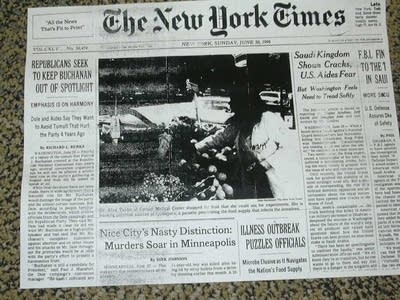Minneapolis residents talk about living with crime

The killing of Michael Zebuhr in Uptown last March shocked many residents. Before then, it was easy to believe that violent crime in Minneapolis happened in other neighborhoods, to people involved in drugs and gangs. But now they were waking up to the fact that random, violent crimes were possible on their streets, too.
In Carl Holmquist's case, right outside his front door where Michael Zebuhr was shot. Holmquist doesn't remember hearing the shootings, but when he came home the next day his block was full of police cars and news vehicles.
"[It] felt like the movie "Crash," with all of these questions, emotions and people discussing the causes of this murder," he said. "Who is to blame? Fear, race. Why is this death being mourned more than others in the city?"
More Minneapolis residents have found themselves grappling with similar questions recently. Erin McCleary, who lives in the St. Anthony West neighborhood, says until a few months ago she didn't know anyone who was a victim of crime. Now, she can think of several, including herself.
Create a More Connected Minnesota
MPR News is your trusted resource for the news you need. With your support, MPR News brings accessible, courageous journalism and authentic conversation to everyone - free of paywalls and barriers. Your gift makes a difference.
"[It] felt like the movie "Crash," with all of these questions, emotions and people discussing the causes of this murder. Who to blame, fear, race, why is this death being mourned more than others in the city?"
McCleary and her husband were held up at gunpoint coming home from dinner one evening. She remembers the robber was cool and composed. He took everything they had on them, including wallets, keys and cell phones. At first, Erin remembers trying to justify what happened.
"In a way, I romanticized the experience by thinking that he robbed us for rent or grocery money," McCleary says.
When she received a cell phone bill with more than $100 worth of downloaded hip hop ring-tones, her feelings changed.
"I realized that we were robbed by someone who at some degree did it for fun. That idea scares me more than anything else. I am not the same person that I was."
Crime has taken its toll in other ways, too. Valeshia King, who lives in north Minneapolis, says that in her neighborhood criminal activity is all around. Her children grew up seeing drug dealers and pimps making money by breaking laws. She found it hard to convince her kids to stay away from that sort of life.
"Who am I to tell my sons that the right way out of this s***hole is to work hard, when the ones flossing and shining are the ones committing the crimes?" King says.
She says her eldest son was particularly attracted to the street life, but had recently agreed to go back to school and get a job.
Two weeks later he and another teen were both shot in the back, one block from King's house. He was in critical condition for several days but eventually recovered. The people who shot him were never found.
King says living in her neighborhood has become much more difficult.
"My family is afraid," King says. "My son won't admit it, but I know he's scared. We have to watch our backs going in and out of the house."
Some neighborhoods are organizing to keep their streets safe. After the Michael Zebuhr killing, Carl Holmquist and his neighbors in Uptown organized two candlelight vigils. Holmquist says the vigils marked a change in his attitude toward the murder.
"It was the beginning of my transition from grieving for the family and community, and beginning to act about this violence in our city," he says.
Holmquist is now part of the Calhoun Area Residents Action Group. He regularly walks his streets as part of the group's "stroll patrol." He says the killing still haunts him, but he's chosen not to be afraid. He hopes to inspire others by his example.
